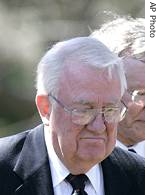2006年VOA标准英语-Reagan Adminstration Aide Says Congress Should(在线收听)
By Mike O'Sullivan
Los Angeles
09 November 2006
A former official of the Reagan administration says Washington should recall the lessons of history as it works to solve the nation's problems. Former U.S. Attorney General Edwin Meese was recently honored in Los Angeles for his efforts in promoting American values. In an interview with VOA's Mike O'Sullivan, he offers some advice for members of the new congress.
-------
 Edwin Meese (2005 photo) |
||
Meese left government in 1988, and has worked as an analyst, speaker and writer in the years since then. He was recently honored in Los Angeles by a conservative group called Americanism Educational League, which got its start as an anti-communist organization in the late 1920s. The former official is disturbed when he sees high levels of spending by Congress, whose members try to get government funding for local projects.
"And I think when the government becomes a vehicle primarily for members of Congress to bring back pork, as they call it, to their districts, they have lost track of what the purpose of Congress is, which is to solve the national problems, those things that are truly national in nature, such as the problems of foreign affairs, of defense, and things such as that," said Edwin Meese.
Meese says President Reagan's tax cuts in the 1980s have spurred two decades of growth, and that tax cuts by President Bush are doing the same. But Democrats say the cuts are helping the wealthy.
Meese faults both parties for the growth of government beyond what he believes the founding fathers envisioned. He adds that his own Republican party has failed to heed the advice of President Reagan about curbing the federal role in education and health care. He is critical of a 2003 law that helps seniors and the disabled buy prescription drugs. The plan will cost the government $678 billion over 10 years, up from a promised cost of $400 billion.
"With the drug prescription bill, it has gotten more deeply into medicine," he said. "And so I think the more that you have of the federal government going beyond its normal powers that the founders had in mind, the more opportunity there is for lobbying, the greater necessity there is from those people whose interests are being affected. And so as a result, there is more chance for some small-scale corruption and scandals, such as we have now."
Political analysts have cited voter frustration over corruption as a factor in the shift in congressional power in Tuesday's election. Democrats have now taken control from Republicans in both houses of Congress.
Another factor in voter surveys was dissatisfaction with the continuing war in Iraq. Meese says, on this subject as well, U.S. history offers lessons.
The former attorney general says the United States suffered growing pains after 1776, when the founders signed the Declaration of Independence.
"People forget, often, that it took the United States a number of years to get into the form of government that we now enjoy 200 and some odd years later," noted Edwin Meese. "The first attempt with articles of confederation was not successful, and the central government was not able to do those things necessary to protect the people or to engage effectively in foreign commerce and in foreign relations. And it wasn't until 1787 with the development of a new constitution, which was then implemented in 1789, that the country really got off to its second start."
He says sectarian divisions complicate the challenge of creating an effective government in Iraq, but that building democracy is always a process of trial and error.